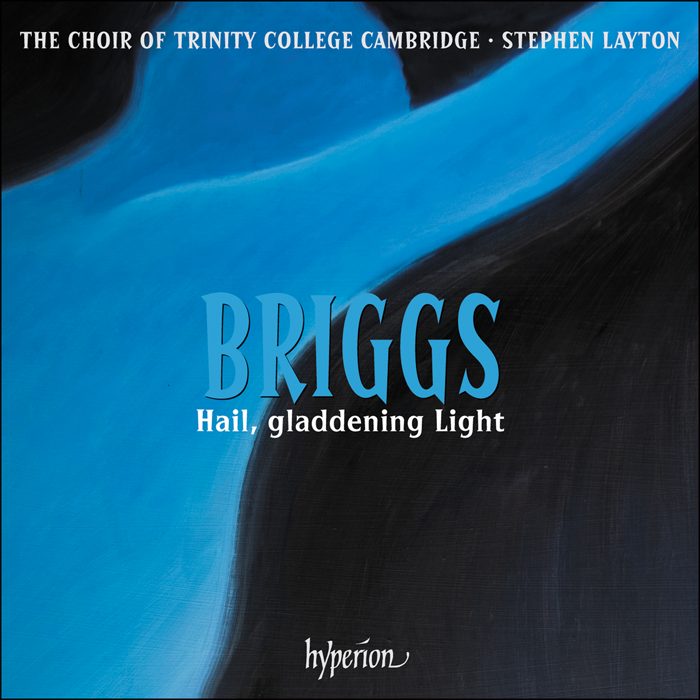The Choir of Trinity College Cambridge has built an unassailable reputation for the quality of its recordings. Amongst the discs under the choir’s ex Director of Music Stephen Layton, there has been a focus on individual composers including Ivo Antognini, Gerald Finzi, Jaako Mäntyjärvi, Cecilia McDowall and Owain Park. This recent issue is the second to spotlight the work of organist/composer David Briggs, who has steadily made a name for himself as a composer of church music that almost rivals his acclaim as an internationally renowned organist. Celebrated also for his organ improvisations, extemporisation has informed many of his own pieces. Indeed, he considers improvisation to be a fundamental aesthetic of his compositional style, believing the act of composition to be ‘slowed down improvisation’.
This thoughtfully curated disc was recorded in the reverberant acoustic of L’église Saint-Eustache, Paris, with most choral pieces linked by a series of related improvisations, performed by Briggs, which furnish a total sequence that is as coherent as it is diverse. While the disc incorporates a portfolio of Briggs’s choral compositions from the past twenty years, an association with Layton goes back much further and the CD, in many ways, is a continuation of the artistic partnership between Layton and Briggs forged in the organ loft at King’s during the 1980s. Together, they have shaped this recording around the unique possibilities afforded by L’église Saint-Eustache, the organ providing a vast tonal palette and the building an ideal acoustic.

While the earlier CD entitled Mass pour Notre-Dame displayed a distinctive Gallic influence (Briggs had studied with Jean Langlais some forty years ago), ‘Hail, gladdening Light’ suggests a wider frame of reference. Bookending the compilation is a setting of the ‘Jubilate’ and ‘Te Deum’, the ‘St Davids Service’ commissioned from the Welsh cathedral in 2010. One can immediately hear a kinship with William Walton in the harmonic language and muscular rhythms of the ‘Jubilate’ (organist Jonathan Lee). Its playfulness, in part deriving from a kind of ‘jousting’ between organ and choir, generates an adrenalin-filled performance that fizzes like freshly opened champagne. The text-laden ‘Te Deum’ (organist Harrison Cole) is no less exhilarating with some wonderfully ecstatic moments for the organ (notably so at ‘Thou art the King of Glory’), as well as passages of haunting beauty from the choir such as ‘We believe thou shalt come to be our Judge’.
The Trinity College Fauxbourdon Service is another commission (2020); an a cappella setting for Stephen Layton’s Cambridge choir that recasts the English Renaissance genre through a twenty-first century prism. Plainchant verses echoing those that William Byrd and his contemporaries would have written alternate with polyphonic choral sections suffused with strikingly pungent harmonies. As a form of shaking hands across the centuries, it’s a thoroughly convincing addition to the repertoire of every cathedral choir. Plainchant also underpins the Easter proclamation that is ‘Surrexit Dominus’, where unison singing alternates or is supported by flamboyant organ writing. And what a blaze of sound Harrison Cole draws from the Paris instrument! The more restrained ‘Vexilla regis’ turns to the ancient alternatim style (popular in the French Baroque), medieval plainchant alternating with contemporary and Gallic-infused organ harmonies.
Amongst the shorter choral items, the disc includes an exquisite a cappella setting of ‘Set me as a seal’, where warmth of expression and shape shifting harmonies are affectionately rendered, if a little under projected, from the basses. A romantic inclination also characterises Briggs’s ‘God be in my head’, subtitled ‘Une prière personnelle’, and also draws much intimacy from the singers. Brigg’s natural gift for melody is shown to advantage in his setting of ‘Ubi caritas’, a mellifluous wedding anthem written for his own marriage in 2004. Reminiscences of Gabriel Fauré can be readily detected in its harmonic idiom and soaring phrases. It’s a piece to listen to again and again! The choir respond to the exhilaration and radiance of the double choir ‘Hail, gladdening Light’, with suitable aplomb.
The organ improvisations provide a fascinating insight into Briggs’s musical influences and vivid imagination. Joseph Fort’s informative booklet notes suggest the ghost of Mahler hovers over his ‘Prelude’, while rippling textures and birdsong catch the ear in the ‘Intermezzo’. Jubilation naturally informs the ‘Toccata on Surrexit Dominus’, its plainchant outlined first in the pedals. By contrast, a sense of reverie opens the candle-lit ‘Cantabile’, Hyperion’s engineers once again enhancing its special atmosphere.
I have no reservations in recommending this attractive compilation; organ playing, singing and clarity of sound is exemplary. Full texts, liner notes and organ specifications are included. Choir directors, if they haven’t done so already, should take note of the name Briggs.
David Truslove
David Briggs: Hail, Gladdening Light and Other Works
Jubilate ‘St Davids Service’, Prelude (organ improvisation), Set me as a seal, God be in my head, Intermezzo (organ improvisation), Surrexit Dominus, Toccata on Surrexit Dominus (organ improvisation), Hail, gladdening Light, Vexilla regis, Ubi caritas et amor, The Trinity College Fauxbourdon Service – Magnificat & Nunc dimittis, Cantabile (organ improvisation), Te Deum, ‘St David’s Service’
The Choir of Trinity College, Cambridge, Harrison Cole and Jonathan lee (organists), Stephen Layton (conductor)
Hyperion: CDA68440 [61.55]
Top Image: The Choir of Trinity College Cambridge © Benjamin Ealovega